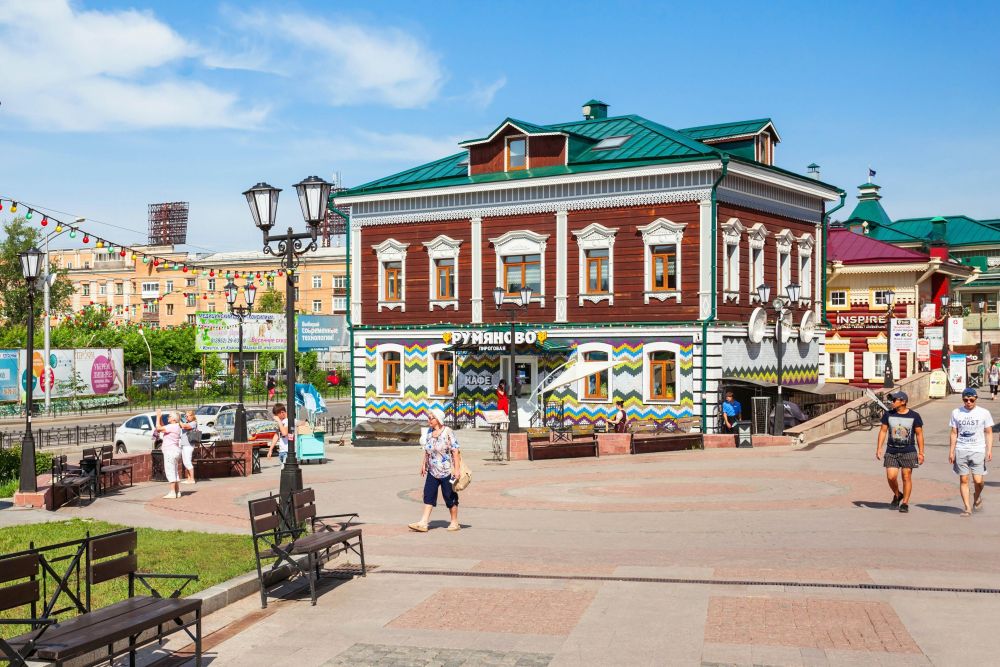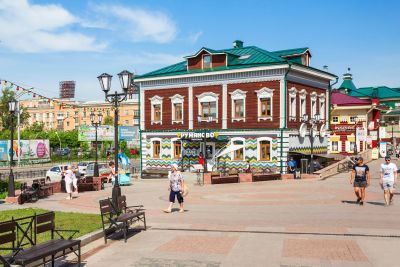

The Irkutsk Regional Historical and Memorial Museum of Decembrists offers visitors a unique glimpse into the history of the Decembrist revolt and its prominent figures, who were exiled to Siberia after the failed uprising of 1825. As you walk through the museum, located in the picturesque 130 Kvartal (Irkutskaya Sloboda), you'll find yourself transported back to the 19th century, exploring the lives, hardships, and cultural impact of the Decembrists on Siberian society. This immersive experience is enhanced by authentic household items, personal belongings, and art from the era, allowing you to truly understand the environment of the period. The museum also hosts educational programs and temporary exhibitions, providing a deeper understanding of the historical context and the role these individuals played in shaping modern Russia.
Located in the heart of the 130 Kvartal, the V. Sukschyov Irkutsk Regional Art Museum is a cultural haven for art enthusiasts. The museum houses an extensive collection of Russian and European art, ranging from ancient icons to modern pieces. Visitors can explore the works of famous Siberian artists and delve into the artistic expressions that characterize this diverse and vast region of Russia. The museum offers not only visual pleasure but also educational activities, lectures, and workshops that cater to both children and adults. The blend of historical art pieces with contemporary exhibitions makes it a must-visit for anyone wanting to experience the breadth of Irkutsk's artistic legacy.
Strolling through the 130 Kvartal, also known as Irkutskaya Sloboda, is akin to walking through a living museum of architectural history. The area has been beautifully preserved and restored, showcasing traditional wooden Siberian houses alongside modern facilities. A guided walking tour can take you through the quaint streets where you'll learn about the rich history of the district, including stories of old merchants and the development of Irkutsk. Along the way, you'll be able to sample local cuisine from various restaurants and cafes, and browse through unique souvenirs in boutique shops. This vibrant part of the city is a testament to the blend of history and contemporary life in Irkutsk.
The Monument to the Founders of the City is a historical landmark located in the 130 Kvartal that pays tribute to the Cossacks who founded Irkutsk in the 17th century. Visitors to the monument can see the bronze figures of the explorers against the backdrop of charming wooden architecture. It is a popular spot for tourists to take photographs and contemplate the origins of this important Siberian city. Around the monument, the atmosphere is vibrant with street performers and local craftsmen selling their wares. The monument serves as a focal point for the city's storied past and is a proud symbol of Irkutsk's heritage and cultural identity.
As evening descends on the 130 Kvartal, the Lantern Alley comes alive with the soft glow of illuminated lamps. This picturesque walkway offers a romantic setting for an evening stroll. Flanked by traditional Siberian wooden buildings and modern establishments, it's a place where the historical charm of Irkutsk meets contemporary design. Along the alley, you'll find cozy cafes and restaurants where you can sample local Siberian dishes or enjoy a coffee break. Lantern Alley is not just a path but an experience that encapsulates the authentic atmosphere of the city, making it a delightful destination for visitors seeking a tranquil yet enchanting escape.
The Cathedral of the Epiphany is a stunning example of Siberian Baroque architecture nestled within the 130 Kvartal. This Orthodox Church is adorned with ornate frescoes and religious icons, creating a sacred and serene atmosphere for contemplation and worship. As one of Irkutsk's oldest religious structures, it has withstood the test of time and revolutions, symbolizing the endurance of faith in the region. Visitors to the cathedral can partake in guided tours, which provide insights into the building's history, artistry, and religious significance. Attending a service here is a spiritually enriching experience, accompanied by the harmonic chants of the choir and the fragrance of incense permeating the air.
Znamensky Monastery, located a short distance from the 130 Kvartal, is a peaceful sanctuary and one of the most important religious sites in Irkutsk. The monastery complex includes a cathedral, chapel, and a museum that explores the history of Orthodoxy in the region. The tranquility of the monastery grounds offers a respite from the hustle and bustle of the city, allowing visitors to reflect and admire the beauty of the religious art and architecture. Guided tours delve into the lives of the monks, historical events associated with the monastery, and the significance of monastic life in Siberia. Whether you seek spiritual solace or historical knowledge, Znamensky Monastery provides an enriching experience for all who enter its gates.
Dedicated to one of Russia's most beloved poets, the Sergei Yesenin Museum in the 130 Kvartal is a literary treasure trove. The museum is situated in a charming wooden house, preserving the atmosphere of the early 20th century when Yesenin created some of his most poignant works. Exhibits include personal belongings, manuscripts, and photographs that tell the story of his life and literary achievements. Visitors can participate in interactive displays and audio guides that recite Yesenin's poetry, providing a deeper connection to the poet's emotional and creative world. The museum is more than just an archival space; it's a source of inspiration, offering insight into the cultural renaissance that swept through Russia during Yesenin's time.
The Icebreaker Angara Museum, located on the banks of the Angara River near the 130 Kvartal, presents a unique piece of maritime history. The Angara is one of the oldest icebreakers in the world and played a crucial role in keeping the waterways navigable during the harsh Siberian winters. Today, it stands as a museum celebrating the technological advancements and significance of the vessel. Aboard the icebreaker, visitors can explore the engine room, captain's bridge, and living quarters, learning about the daily life of the crew who operated this impressive machine. The museum showcases the history of water transport in the region and the development of the Russian fleet in Siberia.
Karl Marx Street, which runs adjacent to the 130 Kvartal, is one of Irkutsk's main thoroughfares and offers a lively shopping experience. This bustling avenue is lined with a variety of stores, boutiques, and local craft shops where you can find anything from trendy clothing to traditional Siberian handicrafts. As you meander along the street, you'll be greeted by historical buildings that house modern cafes and restaurants, offering plenty of opportunities to sample both international cuisine and regional specialties. Immerse yourself in the local culture as you engage with friendly vendors, explore hidden courtyards, and perhaps even participate in seasonal street festivals that celebrate Irkutsk's vibrant community life.
